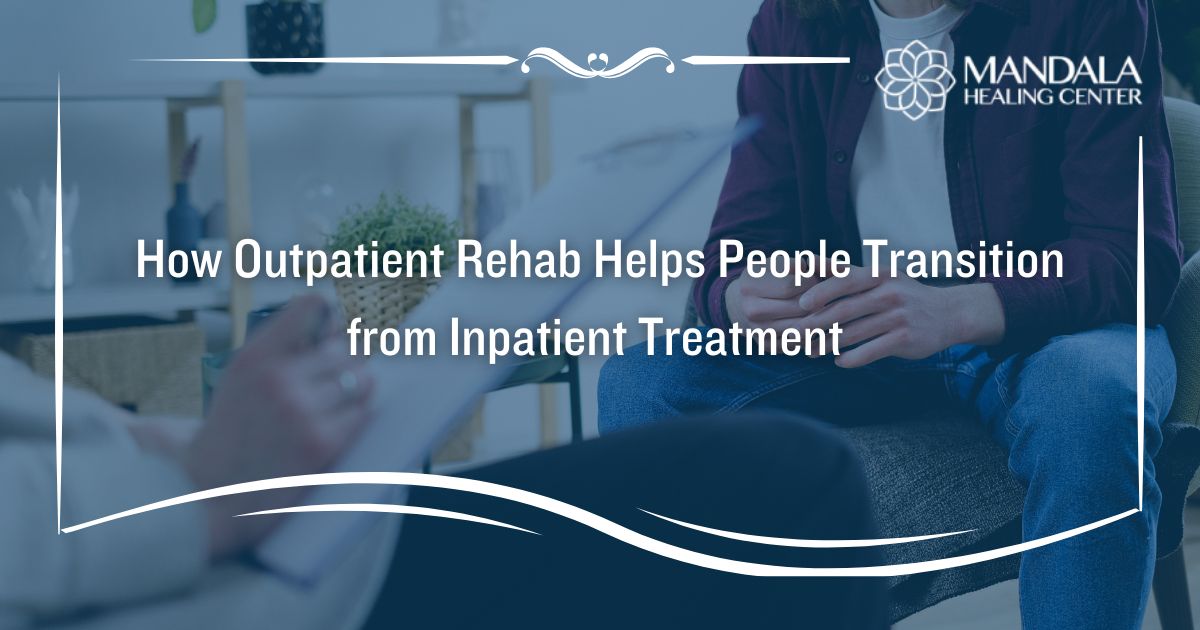The addiction recovery process can be complicated. When you attend an inpatient treatment program, you receive a high level of care on a 24/7 basis. While this is extremely beneficial and often vital, you will get accustomed to the structure these programs offer.
As a result, the transition from inpatient treatment to independence can be difficult. You will be expected to face relapse triggers on your own. Because there is an increased risk of substance abuse during this time, it’s recommended that you enter an outpatient program before diving headfirst into independence.
Entering an outpatient program directly after completing inpatient care decreases your risk of relapsing while you learn how to maintain long-term recovery. For example, outpatient programs will ensure that you remain connected to the recovery services you need, allow you to have some freedom while continuing to offer structure, emphasize the importance of developing relapse prevention skills, and offer the accountability you need to remain sober.
In this article, you will learn:
- What is an outpatient addiction treatment center?
- Why should you transition into an outpatient program after completing inpatient rehab?
- How does outpatient care support long-term recovery?
What is Outpatient Rehab?
Inpatient programs require you to live at the facility while you receive care. In contrast, outpatient programs allow you to live in the comfort of your own home. This means you’ll have to commute to treatment sessions 3 to 5 days per week, depending on your treatment plan.
There are several types of outpatient programs, including:
- Partial Hospitalization Programs (PHPs) – This is the most intensive level of outpatient care, offering most of the services you receive during inpatient programs. Some people choose to attend a PHP instead of an inpatient facility.
- Intensive Outpatient Programs (IOPs) – Intensive outpatient programs still provide a high level of care, however, they offer more freedom and flexibility than PHP. These programs are ideal for someone who has already completed an inpatient program or only suffers from a mild to moderate substance use disorder.
- Outpatient Programs (OPs) – Outpatient programs are the most relaxed form of addiction treatment care. They are not recommended as a standalone treatment option in most cases. That said, they are incredibly helpful for easing the transition from inpatient treatment to independent living.
PHPs tend to require 5 treatment sessions per week, at several hours each day. Sometimes, they are equivalent to the time commitment of a full-time job. IOPs have treatment sessions 3 to 5 days per week, depending on your needs, while OPs only ask you to attend sessions 3 days per week.
Transitioning From Inpatient to Outpatient Rehab: Why It’s the Best Option
If you are completing an inpatient rehab program soon, it’s time to start thinking about your next steps. Your treatment team might have suggested that you attend an outpatient program directly after your inpatient treatment is completed to ensure a successful transition to independent living.
Attending an outpatient rehab after receiving inpatient care can help the transition process by offering:
Continued Access to Addiction Recovery Services
Outpatient treatment programs offer services like individual therapy, group counseling, medication management, mental health care, and relapse prevention planning. Continuing to engage in addiction recovery services while you learn how to be independent lessens your chance of relapsing. Instead of facing triggers on your own, you’ll have a team of support to rely on.
Structure With Flexibility and Independence
The level of structure your outpatient treatment provides will depend on what type of program you choose. For example, PHP offers a higher level of structure than IOP or OP programs. That said, every outpatient treatment center requires multiple treatment sessions per week, ensuring you are focusing on improving your recovery journey.
Having structured days filled with therapy sessions and building life skills will improve your chances of maintaining long-term sobriety. You’ll also be able to experience independence for a portion of the week, giving you a trial run to experience sobriety in the real world while you still have access to support.
A Focus on Relapse Prevention Planning
Outpatient programs use evidence-based treatments to ensure you know how to maintain your sobriety. Because you’ll be spending half of your time outside of a treatment facility, outpatient programs heavily focus on relapse prevention planning. You’ll learn about potential triggers for relapse, develop healthy coping skills, and create plans of action to use in case you experience a relapse later on.
Increased Accountability
During outpatient programs, you will be expected to pass drug and alcohol testing. This testing will likely be random, which means you won’t be able to hide whether you’ve been abusing substances. Having randomized drug testing increases your accountability for your sobriety, making you less likely to relapse during the tough transitional stage of recovery.
Get Connected to an Outpatient Addiction Treatment Center
If you or a loved one is completing an inpatient rehab program, it’s time to consider whether outpatient is the best next step. At the Mandala Healing Center, we offer evidence-based and individualized outpatient care, ensuring that you get the tools and support you need to recover.
Contact us today for more information on our outpatient drug and alcohol rehab program in West Palm Beach.
















